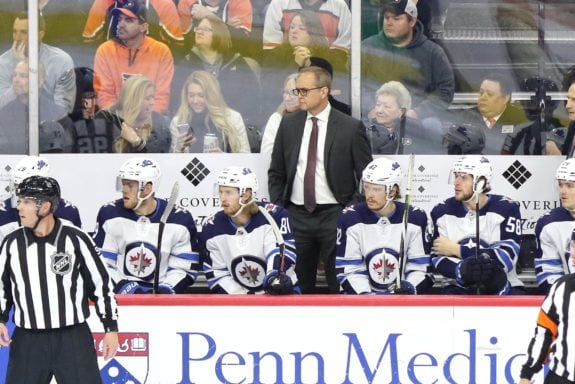On Wednesday, a friend and I were watching the Jets/Canadiens game at my apartment (he is one of my two designated household visitors here in Manitoba.)
With about three minutes left and the Jets leading 3-2, he said, and I quote: “I sure hope the Jets get a point in this game.”
“What the heck is he talking about”? you might ask. Shouldn’t the Jets win, let alone lose in regulation? Was he drunk? Does he just not know how hockey works?

It was St. Patrick’s Day, but he was stone-cold sober. And I’d say he’s more knowledgable than 90 per cent of Jets fans.
As the Canadiens pressed, he expressed he felt the Jets play poorly in the final minutes and that they often clutch defeat out of the jaws of victory.
He’s a keen observer. I covered earlier this season how the Jets squandered points by allowing a game-winner with less than two minutes to go three separate times, with two of those goals allowed with less than 10 ticks on the clock.
Related: Jets Squandering Crucial Points with Late-Game Breakdowns
He also expressed the opinion the Jets are poor at defending when the opponent pulls their goalie for an extra attacker, that he was getting a sickly “here-we-go-again” feeling, and that the game would soon be tied.
So — Do the Jets Really Allow a Lot of Late Goals?
Or is my friend just a doomer?
It’s the latter. The Jets have allowed a goal with less than two minutes to go — with the opponent’s goalie pulled — no fewer than four times this season. All four instances have occurred in the last month.
Less than a minute after saying he had a bad feeling, the Canadiens pulled Carey Price. In the Jets’ zone, Tyler Toffoli outworked Tucker Poolman and Mark Scheifele behind the net and got the puck to Josh Anderson.
Anderson dished the puck to Corey Perry, who quickly executed a perfect back-door pass to Toffoli, who wired the puck past Connor Hellebuyck‘s blocker with 1:25 to go. Josh Morrissey had totally lost track of Toffoli on the play, leaving the star scorer wide open by the side of the net.
The Jets also allowed game-tying goals with an opponent’s net empty on Feb. 21 against the Vancouver Canucks (to Elias Petterson with 44 seconds to go) and on March 4 against the Canadiens (to Perry, with 1:24 to go.)
Additionally, they allowed a goal to the Maple Leafs when the Leafs had an extra attacker on March 9 (to Auston Matthews with 1:54 to go.) However, that goal came when the Maple Leafs were down 4-2. The Jets just managed to survive the onslaught the Leafs brought thereafter to hang on for a 4-3 win.

The Jets have scored five empty netters this season: on Jan. 23 versus the Ottawa Senators, Jan. 26 versus the Edmonton Oilers, Feb. 4 versus the Calgary Flames, on Feb. 19 at the Canucks, and on Feb. 25 versus the Canadiens. They have allowed three goals with their opponent’s net empty since their last empty net goal.
Only two of those goals — Andrew Copp’s on Jan. 26 and Mason Appleton’s on Feb. 19 — came when the Jets were leading by one goal. The other three came with the Jets leading by two.
Why Does This Keep Happening?
There are two main reasons: a lack of pressure and untimely defensive breakdowns.
Take a look at Elias Petterson‘s game-tying goal at 7:05 of the below highlight pack to see the Jets’ defenders collapse into a tiny box in front of the net and stand around as the Canucks blast chance after chance on net, almost completely unchallenged.
No other teams defend this way late in games: they all get a man to put pressure on the puck carrier so he doesn’t have tons of time to make a decision on what to do. You saw the Oilers do that Thursday when the Jets pulled Laurent Brossoit when trying to tie the game at 2-2.
(The Jets have played this passive style on the penalty kill for years too, and it’s rarely serve them well.)
Untimely defensive lapses — just like the ones that led to the late regulation goals — are also to blame. We already broke down Morrissey’s recent blunder above.
Taking a closer look at Matthews’ goal on March 9, it was Blake Wheeler — who has been one of the Jets’ weakest defensive forwards this season, especially early on — who was doing nothing in particular and watched Auston Matthews poke it in on the doorstep.
Taking a closer look at Corey Perry’s goal on March 4 that tied the game 3-3, it was Tucker Poolman who lost the puck to Toffoli behind the net. The Canadiens cycled it back to Jeff Petry at the point, and the d-man’s shot was tipped home by Perry.
A lot of these chances come from the Jets’ inability to execute — on any consistent basis — clean zone exits. Failing to clear the zone is a problem they have at all points in games, not just in the final minutes. But those final minute failures loom the largest.
Head Coach Doesn’t See Any Problem…
Head coach Paul Maurice — despite the obvious trend of opponents scoring with the extra attacker — said post-game Wednesday that his team is strong in the third period and that allowing late goals isn’t an issue the team needs to address.
“I don’t think that’s prevalent in our game,” Maurice said of their rocky third period, where the Canadiens controlled play. “We’ve been a really, really strong third-period team but we didn’t move the puck and they’re a real good team in terms of getting on top of you.”

“Part of it was their aggressiveness,” he continued. “We had a lot of icings there in the third period and I thought we had places that we had plays to make. But I haven’t found that to be part of our game or a third-period theme for our team at all. We’ve been pretty strong in the third and we’ll take the two points, find a way to win.”
…Perhaps Because Jets Have Gotten Away With It So Far
It’s true: the Jets haven’t been burned by allowing late goals to tie yet. They’ve found a way to win each time, as the bench boss said.
On the three occasions it’s happened, they were victorious in overtime. That’s thanks to their raw offensive talent and Maurice’s novel concept of deploying three forwards in three-on-three. Pierre-Luc Dubois has two of the overtime game-winners, while Nikolaj Ehlers potted the most recent one.

But it’d be better if the games didn’t get to overtime in the first place. There’s no three-on-three in the playoffs, which the Jets are likely to make. Just five-on-five until someone wins.
Perhaps calling a time out would help settle the yips and get the team focused on doing the right things.
Being more aggressive would certainly make a difference, too. If you’re going to get burned, you might as well get burned because you were trying to be dogged on the puck, not because you were standing around letting the opponent tee off.
It’d be nice to have some confidence that the Jets will hold onto a late lead and win in regulation. Then, fans like my friend won’t have to feel that sinking feeling when the opponent’s goalie dashes to the benches.
Declan Schroeder is a 26-year-old communications specialist and freelance journalist in Winnipeg, Manitoba. He holds a diploma in Creative Communications with a major in journalism from Red River College and a bachelors in Rhetoric and Communications from the University of Winnipeg.
Deeply rooted in the city’s hockey culture, the original Jets skipped town when he was two and the 2.0 version came onto the scene when he was 17.
